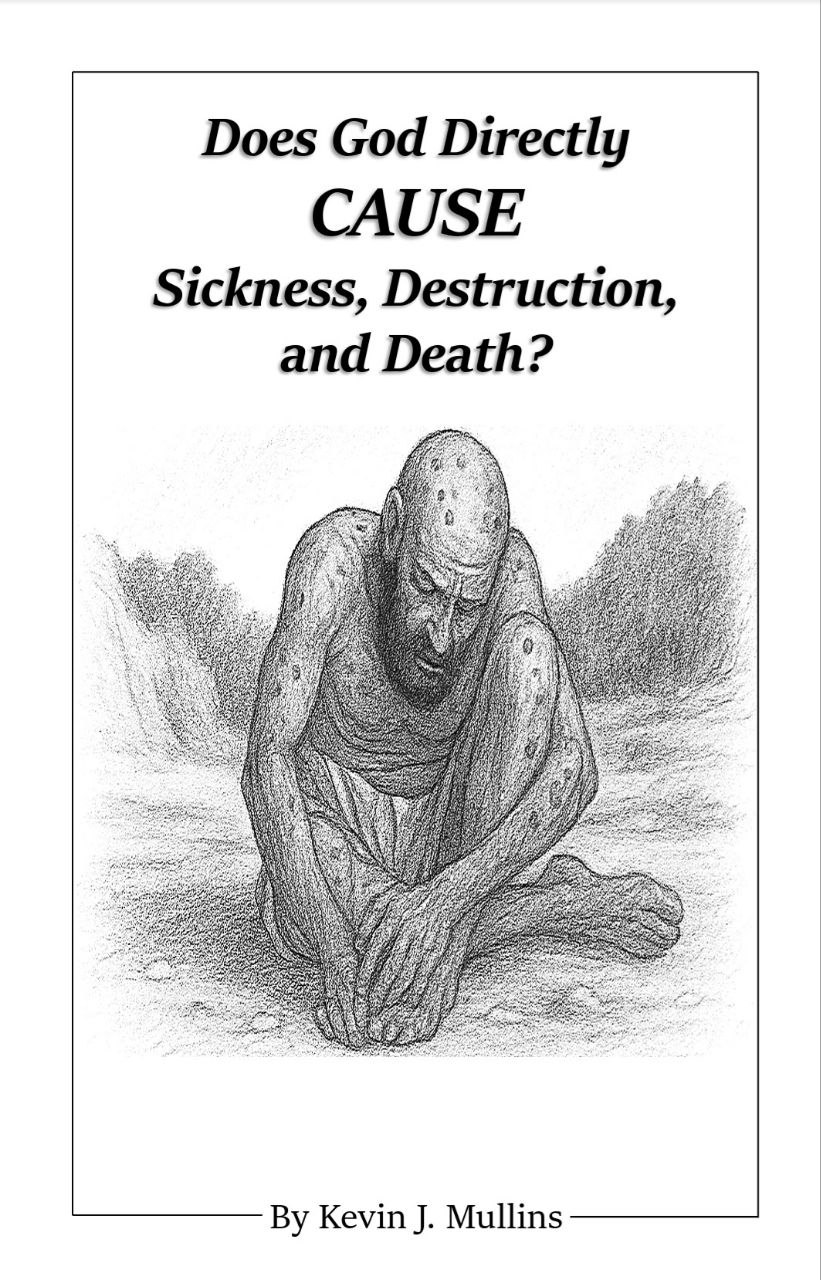(Daniel 7:8) Who is the Little Horn? - Part One
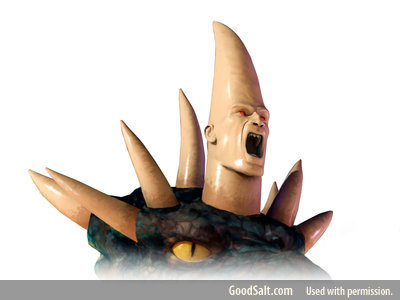 “I considered the horns, and, behold, there came up among them another little horn, before whom there were three of the first horns plucked up by the roots: and, behold, in this horn were eyes like the eyes of man, and a mouth speaking great things.” (Daniel 7:8)
“I considered the horns, and, behold, there came up among them another little horn, before whom there were three of the first horns plucked up by the roots: and, behold, in this horn were eyes like the eyes of man, and a mouth speaking great things.” (Daniel 7:8)
From our previous studies we have seen that this little horn is a religious system which rises from the Roman empire among the other ten horns (powers) shortly after 476 A.D. We should not be looking to any other location on earth than Rome. In order to determine who this power is, let’s review its characteristics we saw from our previous study:
- The little horn power is a religious system that would rise after and among the other ten horns are established. This means it must rise shortly after 476 A.D.
- It’s government will be different than the first ten.
- It will uproot three of the previous ten horns (powers)
- The little horn is described as having eyes like a man. A man will be at the head thus it will have fallen humanities’ understanding (eyes) of religion and government (justice, laws, legislation etc.).
- It will speak great words against the Most High (God).
- It will wear out (persecute) God’s people.
- It will think to change (God’s) Times and Laws.
- It will reign for “a time and times and the dividing of time.”
The angel had told Daniel that “the fourth beast shall be the fourth kingdom upon earth, which shall be diverse from all kingdoms.” Then we learn that the little horn within this kingdom “shall be diverse from the first” ten horns. We learned in our previous study that the kingdom of Rome as a whole inherited and subdued all of the characteristics and pagan philosophy from the previous three kingdoms of Babylon, Medo-Persia and Greece. Rome came in two stages. First was its political stage in which it was simply known as Pagan Rome as it was conquering the then known world.
In Daniel chapter 8 we read of this little horn as it was gaining power. In our first study in this series we saw that Daniel had a vision of a ram and a goat that he recorded in Daniel chapter 8. The ram represented “the kings of Media and Persia” while the goat represented “the king of Greecia.” (Verses 20, 21). We then learned that, after Greece was conquered, it was dived into four parts among Alexander the Great’s generals (Verse 8). After this Daniel records:
“And out of one of them came forth a little horn, which waxed exceeding great, toward the south, and toward the east, and toward the pleasant land. And it waxed great, even to the host of heaven; and it cast down some of the host and of the stars to the ground, and stamped upon them. Yea, he magnified himself even to the prince of the host, and by him the daily sacrifice was taken away, and the place of his sanctuary was cast down. And an host was given him against the daily sacrifice by reason of transgression, and it cast down the truth to the ground; and it practised, and prospered.” (Daniel 8:9-12)
On page 159 in his classic book, Daniel and the Revelation, Uriah Smith writes:
“The little horn waxed great toward the south. This was true of Rome. Egypt was made a province of the Roman Empire in 30 B.C., and continued such for centuries. The little horn waxed great toward the east. This also was true of Rome. She conquered Syria in 65 B.C., and made it a province. The little horn waxed great toward the pleasant land. So did Rome. Judea is called ‘the pleasant land’ in many Scriptures. The Romans made it a province of their empire in 63 B.C., and eventually destroyed the city and the temple, and scattered the Jews throughout the earth.”
There is absolutely no reason to change the location of this little horn from Rome to anywhere else. There is also no reason to change the timeline of when this little horn would rise into power (after 476 B.C.).
Who the Little Horn is Not
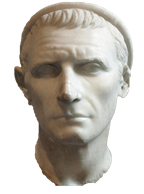 Most Bible commentators today say that the little horn power represents Antoichus Epiphanies who desecrated the Temple by sacrificing a pig on the altar. Daniel said, “And out of one of them came forth a little horn.” A lot of commentators believe the phrase "out of one of them" means the little horn was to rise out of one of the four divisions of Greece. One of those rulers, or kingdoms, was the Seleucid Dynasty from which Antiochus Epiphanes arose. However, the angel Gabriel told Daniel that the “little horn” would rise “in the latter time of their kingdom” (Daniel 8:21-23). The Seleucid Dynasty consisted of more than twenty kings who ruled from 311 to 65 B.C. Antiochus was eighth which is far from reigning in the “latter time” of their kingdom. How can Antiochus fulfill this prophecy if he died over 150 years before the birth of Jesus well before 476 A.D.? Clearly 150 years before the Messiah is way off the mark.
Most Bible commentators today say that the little horn power represents Antoichus Epiphanies who desecrated the Temple by sacrificing a pig on the altar. Daniel said, “And out of one of them came forth a little horn.” A lot of commentators believe the phrase "out of one of them" means the little horn was to rise out of one of the four divisions of Greece. One of those rulers, or kingdoms, was the Seleucid Dynasty from which Antiochus Epiphanes arose. However, the angel Gabriel told Daniel that the “little horn” would rise “in the latter time of their kingdom” (Daniel 8:21-23). The Seleucid Dynasty consisted of more than twenty kings who ruled from 311 to 65 B.C. Antiochus was eighth which is far from reigning in the “latter time” of their kingdom. How can Antiochus fulfill this prophecy if he died over 150 years before the birth of Jesus well before 476 A.D.? Clearly 150 years before the Messiah is way off the mark.
“Persia was called ‘great,’ [Daniel 8:4]. Grecia was called ‘very great’ [Verse 8], now this power which surpasses them all, is called ‘exceeding great’ [Verse 9] … Rome conquered Macedonia, thus taking over one of the four ‘horns’ of Greecia. Rome then grew into its destiny, and moved on to world conquest. After 168 B.C., Rome became recognized as the new world empire. No king of Macedonia could be called this ‘little horn,’ for none of them was ‘exceeding great.’ The strongest of them, Antiochus Epiphanes, was forced to leave Egypt at the rude command of the Romans. Does not the stronger drive out the weaker? The Romans were therefore the ‘exceeding great’ power ... This is important to realize, for some people oppose this prophecy by saying Antiochus Epiphanes was the ‘little horn,’ thus throwing the book of Daniel into confusion (as many people mistakenly think it is).” (Robert J. Weiland, The Gospel in Daniel, pp. 108,109)
Besides all this, the prophecy of the little horn is connected to “the abomination of desolation” (Daniel 9:26, 27; 11:31; 12:11). What is “the abomination of desolation”? We see a clue in the Apocrypha book of 1 Maccabees where, in the year 164 B.C., Judas Maccabeus purified the temple after it had been defiled by Antiochus Epiphanes. In chapter 1 it says, “Now the fifteenth day of the month Casleu [Kislev, late November - late December], in the hundred forty and fifth year, they set up the abomination of desolation upon the altar, and builded idol altars throughout the cities of Judah on every side” (1 Maccabees 1:54).
What did Antiochus Epiphanes do?
1. He introduced a false god to worship. He set up an altar to Zeus in the Second Temple in Jerusalem.
2. He killed over eighty thousand men, women, and children and sold forty thousand into slavery.
3. Mingled truth with error. He sacrificed swine (which is an unclean creature, Leviticus 11:7) on the altar of burnt offerings within the Temple grounds around the year 167 B.C.
4. He also outlawed Judaism including the feast days and the weekly Sabbath.
Although Judas calls this “the abomination of desolation”, it is not only meant for his time. In fact, the cleansing of the sanctuary mentioned in Daniel 8:14 is most often attributed to the time when Judas purified the temple on December 25, 164 B.C. However, when Daniel asked the angel Gabriel about this cleansing, Gabriel said, “Understand, O son of man: for at the time of the end shall be the vision.” (Daniel 8:17). Clearly 164 B.C. could not be “the time of the end.” (We’ll come back to this “time of the end” in the next study).
Jesus applies the abomination of desolation to a future event from His time:
“When ye therefore shall see the abomination of desolation, spoken of by Daniel the prophet, stand in the holy place, (whoso readeth, let him understand:) Then let them which be in Judaea flee into the mountains.” (Matthew 24:15, 16)
Jesus also said: “And when ye shall see Jerusalem compassed with armies, then know that the desolation thereof is nigh.” (Luke 21:20). Here, Jesus is referring to the destruction of Jerusalem in 70 A.D. Judas Maccabeus even says something similar to what Jesus said back in his day when he wrote:
“Also that they had pulled down the abomination, which he had set up upon the altar in Jerusalem, and that they had compassed about the sanctuary with high walls, as before, and his city Bethsura” (1 Maccabees 6:7)
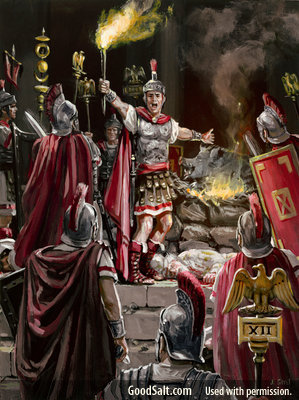 After Titus destroyed the Temple in 70 AD, Hadrian became Caesar in 117 – 138 AD. He became a mirror image to Antiochus.
After Titus destroyed the Temple in 70 AD, Hadrian became Caesar in 117 – 138 AD. He became a mirror image to Antiochus.
1. Hadrian set up a temple to the Greek god Jupiter on the Temple Mount and made Jerusalem the capitol city of the Roman world.
2. He killed about 600,000 Jews.
3. He sacrificed swine on the altar to Jupiter.
4. He outlawed Judaism including the feast days and the weekly Sabbath.
Paul also spoke of this “little horn” calling it “the man of sin” who would be revealed after a “falling away” occurs. He says this “man of sin … opposeth and exalteth himself above all that is called God, or that is worshipped; so that he as God sitteth in the temple of God, showing himself that he is God.” (2 Thessalonians 2:1-4). Here we see that “temple” again. Could Daniel be referring to this temple that Paul is speaking of, rather than a literal temple built in Jerusalem?
Paul is writing these things in a letter to the Thessalonians. He adds, “Remember ye not, that, when I was yet with you, I told you these things?” (Verse. 5). Although he is now writing these things in a letter, he reminds them that he personally spoke these things to them while he was visiting them earlier. We read of this visitation in Acts 17 where it says, “Now when they had passed through Amphipolis and Apollonia, they came to Thessalonica, where was a synagogue of the Jews: And Paul, as his manner was, went in unto them, and three Sabbath days reasoned with them out of the scriptures.” (Acts 17:1, 2). What Scriptures would Paul have used to teach them of this coming “man of sin” who would sit in the temple showing himself as God? It must have been from the book of Daniel (see, Daniel 8:10, 11; 11:36). Therefore, Paul is showing us the true temple that would be defiled by the little horn.
Indeed, Ezekiel prophesied of a rebuilt temple. However, the prophet Zechariah clearly points out that Jesus Himself would build this temple (Zechariah 6:12-13). Paul states that WE are that temple:
“Know ye not that ye are the temple of God, and that the Spirit of God dwelleth in you? If any man defile the temple of God, him shall God destroy; for the temple of God is holy, which temple ye are.” (1 Corinthians 3:16, 17)
When referring to us as the temple, notice how Paul quotes from Ezekiel 37:
Ezekiel:
“Moreover I will make a covenant of peace with them; it shall be an everlasting covenant with them: and I will place them, and multiply them, and will set my sanctuary in the midst of them for evermore. My tabernacle also shall be with them: yea, I will be their God, and they shall be my people. And the heathen shall know that I the LORD do sanctify Israel, when my sanctuary shall be in the midst of them for evermore.” (Ezekiel 37:26-28)
Paul:
“… for ye are the temple of the living God; as God hath said, I will dwell in them, and walk in them; and I will be their God, and they shall be my people.” (2 Corinthians 6:16)
And, referring to us as the temple, James quotes the prophet Amos:
Amos:
“In that day will I raise up the tabernacle of David that is fallen, and close up the breaches thereof; and I will raise up his ruins, and I will build it as in the days of old: That they may possess the remnant of Edom, and of all the heathen, which are called by my name, saith the LORD that doeth this.” (Amos 9:11, 12)
James:
“And after they had held their peace, James answered, saying, Men and brethren, hearken unto me: Simeon hath declared how God at the first did visit the Gentiles, to take out of them a people for his name. And to this agree the words of the prophets; as it is written, After this I will return, and will build again the tabernacle of David, which is fallen down; and I will build again the ruins thereof, and I will set it up: That the residue of men might seek after the Lord, and all the Gentiles, upon whom my name is called, saith the Lord, who doeth all these things.” (Acts 15:13-17)
In the letter to the Ehesians, Paul explained that we are being built up as the temple, "built upon the foundation of the apostles and prophets" with "Jesus Christ Himself being the chief corner stone":
"Now therefore ye are no more strangers and foreigners, but fellowcitizens with the saints, and of the household of God; And are built upon the foundation of the apostles and prophets, Jesus Christ Himself being the chief corner stone; In whom all the building fitly framed together groweth unto an holy temple in the Lord: In whom ye also are builded together for an habitation of God through the Spirit." (Ephesians 2:19-22)
In the book of Revelation John sees the complete fulfillment of this rebuilt temple spoken of by Paul and yet he describes this temple nearly word for word from Ezekiel:
Ezekiel:
"And by the river upon the bank thereof, on this side and on that side, shall grow all trees for meat (food), whose leaf shall not fade, neither shall the fruit thereof be consumed: it shall bring forth new fruit according to his months, because their waters they issued out of the sanctuary: and the fruit thereof shall be for meat (food), and the leaf thereof for medicine." (Ezekiel 47:12)
John:
"And there came unto me one of the seven angels which had the seven vials full of the seven last plagues, and talked with me, saying, Come hither, I will show thee the bride (the church), the Lamb's (Jesus') wife. And he carried me away in the spirit to a great and high mountain, and showed me that great city, the holy Jerusalem, descending out of heaven from God, having the glory (character) of God ... And the wall of the city had twelve foundations, and in them the names of the twelve apostles of the Lamb (the chief corner stone) ... And he showed me a pure river of water of life, clear as crystal, proceeding out of the throne of God and of the Lamb. In the midst of the street of it, and on either side of the river, was there the tree of life, which bare twelve manner of fruits, and yielded her fruit every month: and the leaves of the tree were for the healing of the nations." (Revelation 21:9-11, 14; 22:1, 2)
When John refers to "the holy Jerusalem" he is not speaking about literal Jerusalem in the middle east; for he sees it "descending out of heaven." This "Jerusalem" is the "new Jerusalem" he sees "coming down from God out of heaven, prepared as a bride for her husband (Jesus)" (Revelation 21:2). Paul calls this Jerusalem the "heavenly Jerusalem", God's church made up of all believers in Christ:
"For ye are not come unto the mount that might be touched, and that burned with fire, nor unto blackness, and darkness, and tempest ... But ye are come unto mount Zion, and unto the city of the living God, the heavenly Jerusalem, and to an innumerable company of angels, To the general assembly and church of the firstborn, which are written in heaven ..." (Hebrews 12:18, 22, 23)
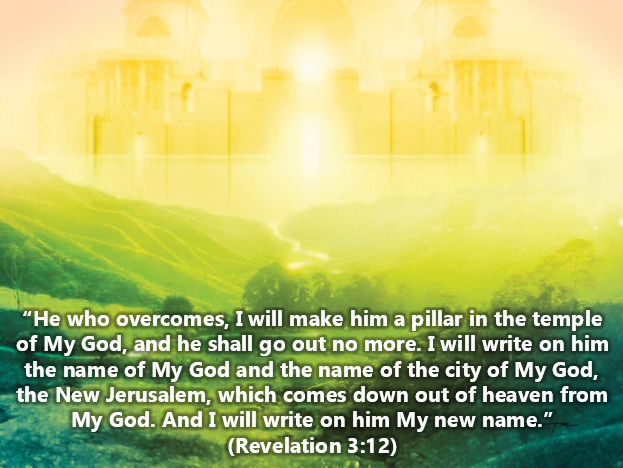
Clearly, this is not an earthly temple made by Jews to be occupied in Jerusalem here on earth during the millennium; for Stephen said, " ... Solomon built Him a House. However, the Most High does not dwell in temples made with hands ..." (Acts 7:47, 48).
Since both Jesus and Paul teach that the “abomination of desolation” will come in the future from their time, we must conclude that it was not an isolated incident fulfilled by Antiochus Epiphanes. This falls under the concept of Ecclesiastes chapter 1 where it is written, “The thing that hath been, it is that which shall be; and that which is done is that which shall be done: and there is no new thing under the sun.” (Verses 9, 10).
Speaking of those people and events from of old, Paul says, “And all these came upon them as examples, and they were written as a warning to us, on whom the ends of the ages have come.” (1 Corinthians 10:11). Yes, history will repeat itself.
It is the little horn power from Rome who will spiritually sit in God’s temple (the church), enthroned on the hearts and minds of its members, deceiving us to believe things that are not true about our Father’s character. This is why it (the church) needs to be cleansed/purified during “the time of the end” just before Jesus returns. (More on that later).
The True Identity of the Little Horn
In Revelation 13:2 we read, “and the dragon gave him (the ten-horned beast) his power, and his seat, and great authority.” The dragon transfers its power, seat and authority over to this new power. Remember, the “dragon” ultimately represents Satan (Revelation 12:9), but also represents his workings through Roman Empire. This transfer of power is being done within the same kingdom. A change within the kingdom is taking place— “it shall be diverse from the first.” It is changing from a mere political power to a religio-political power. A church-state, with the church controlling the state! (a woman riding/controlling the beast). It is a change from Pagan Rome to Papal Rome: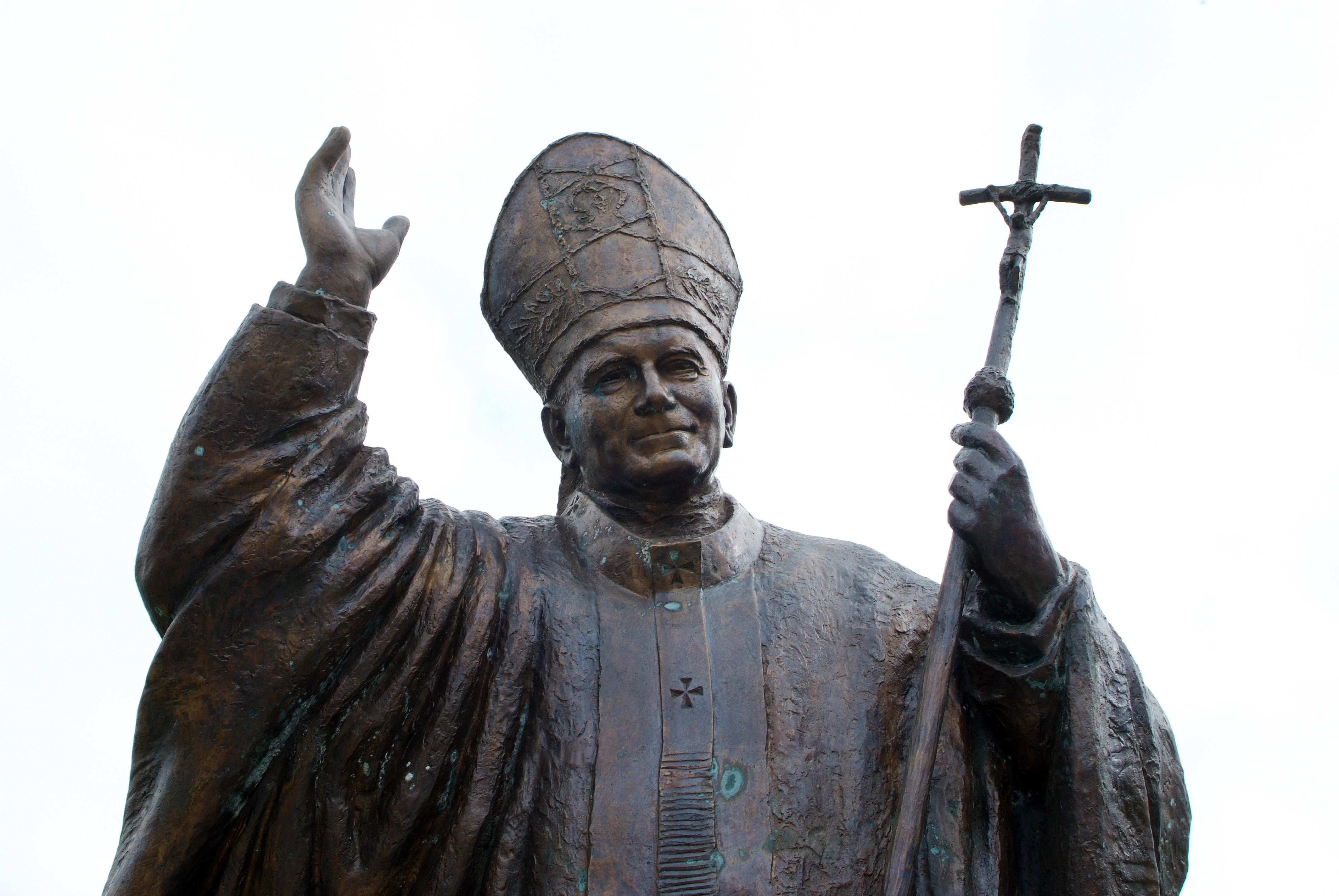
“To the succession of the Caesars [pagan Rome/dragon] came the succession of the pontiffs [papacy/little horn] in Rome. When Constantine [a pagan emperor] left Rome he gave his seat to the pontiff.” (Labianca, Professor of History. University of Rome)
Most Protestants have no idea, or forgotten, or are purposely trying to forget that as far back as the second century most of God’s people accused the religious/political power of the Roman Catholic Church (Papacy/Papal Rome) as fulfilling Daniel’s prophecy of the little horn. In fact, it was Martin Luther (a devoted Catholic monk and the founder of the Lutheran Church) who said this warning concerning the church he loved in the 1500’s: “... Already I feel greater liberty in my heart; for at last I know that the pope is antichrist, and that his doctrine is that of Satan himself” (-D’ Aubigne, b. 6, ch. 9). By using Scripture as his foundation, Luther had accepted what countless others were claiming years before him concerning the church of Rome.
The Waldensians, 1100 A.D.: “Antichrist, the predicted murderer of the saints, hath already appeared in his true character, seated monarchally in the seven-hilled city.” (The Waldensians, The Noble Lesson, 1100 A.D.)
John Wycliffe (1324-1384): “Why is it necessary in unbelief to look for another Antichrist? Hence in the seventh chapter of Daniel Antichrist is forcefully described by a horn arising in the time of the 4th kingdom … the ten horns are the whole of our temporal rulers, and the horn has arisen from the ten horns, having eyes and a mouth speaking great things against the Lofty One, and wearing out the saints of the Most High, and thinking that he is able to change times and laws. [Daniel 7:8, 25 quoted] … For so our clergy foresee the lord pope, as it is said of the eighth blaspheming little head.” (Translated from Wycliffe's, De Veritate Sacrae Scripturae [The Truth of Scripture], vol. 3 pp. 262, 263)
The Papacy Incorporates Paganism
This adoption of the old Babylonian power and religion by the little horn (papacy) is foretold in Scripture. However, most people miss it because of an added word due to a misinterpretation.
“And out of one of them came forth a little horn, which waxed exceeding great, toward the south, and toward the east, and toward the pleasant land. And it waxed great, even to the host of heaven; and it cast down some of the host and of the stars to the ground, and stamped upon them. Yea, he magnified himself even to the prince of the host, and by him the daily [sacrifice] was taken away, and the place of his sanctuary was cast down. And an host was given him against the daily [sacrifice] by reason of transgression, and it cast down the truth to the ground; and it practised, and prospered.” (Daniel 8:9-12)
The added word by most translators that we are concerned about here is the word "sacrifice." But before we dig into that, let’s look at a few other words and phrases from the above passages:
- “Out of one of them.” This is referring to the previous verse which says, “Therefore the he goat (Greece) waxed very great: and when he was strong, the great horn was broken (Alexander dies); and for it (from it) came up four notable ones (his generals) toward the four winds of heaven.” (Verse 8). Verse 9 begins by saying, “and out of one of them …” This is actually referring to the four winds (north, east, south, west), that is mentioned and not to the four horns (the four divisions of Greece) - “Out of one of the four winds came forth a little horn.”
- “The Pleasant land.” This refers to Jerusalem. Since the little horn is seen traveling “toward the south, and toward the east, and toward the pleasant land (Jerusalem) in the southeast, then the little horn came out of the northwest.
- “The host of heaven.” This is speaking of a group of people. In this case, it is God’s church/people. The little horn power (Rome) would “cast down (persecute/suppress) some of the host (God’s people) …”
- “The stars.” This is speaking of “the elect” or “the leaders” of God’s church/people. In vision, John sees Jesus holding “seven stars” which Jesus tells him represent “the angels (leaders) of the seven churches” (Revelation 1:16, 20, we’ll discuss these seven churches in another study). Jesus also said, “For there shall arise false Christs, and false prophets, and shall show great signs and wonders; insomuch that, if it were possible, they shall deceive the very elect.” (Matthew 24:24).
So here’s what we have so far:
“And out of one of them (the four winds) came forth a little horn (Rome), which waxed exceeding great, toward the south, and toward the east, and toward the pleasant land (Jerusalem). And it waxed great, even to the host of heaven (God’s people); and it cast down (persecuted/suppressed) some of the host (God’s people) and of the stars (elect/leaders) to the ground, and stamped upon them. Yea, he magnified himself even to the Prince of the host, and by him the daily [sacrifice] was taken away …"
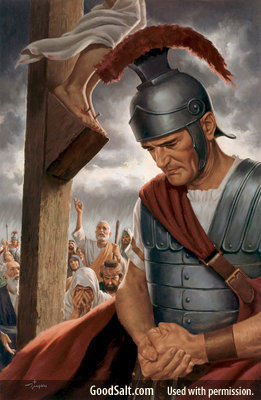 Here we see that the little horn would magnify himself “even to the Prince of the host.” Daniel says this Prince is “the Messiah the Prince” (Daniel 9:25) – Jesus. In Daniel 8:25 it says the little horn would “stand up against the Prince of princes.” This is clearly an allusion to the crucifixion of Christ at the hands of Rome. But what is this “daily [sacrifice]” all about?
Here we see that the little horn would magnify himself “even to the Prince of the host.” Daniel says this Prince is “the Messiah the Prince” (Daniel 9:25) – Jesus. In Daniel 8:25 it says the little horn would “stand up against the Prince of princes.” This is clearly an allusion to the crucifixion of Christ at the hands of Rome. But what is this “daily [sacrifice]” all about?
If you have a King James Version (KJV) Bible, you will notice that the word “sacrifice” here is in italics showing that this word is not in the original. Most other versions do not even italicize it, which causes even more confusion. The phrase actually says, “and by him the daily was taken away.” But why is this so important?
In the original Hebrew, the term “the daily” is תָּמִיד (ha tamid). This word means “the continual.” It is used as a noun and not a verb. When Daniel says “taken away” he uses the Hebrew word רוּם (ruwm). This word means “to exalt,” “to go on high,” or “to lift up.” In fact, every use of this word in Scripture has this meaning in its context. In Daniel 4:37 ruwm is translated as “extol” in the KJV meaning “exalt.” The Jubilee Bible says, “build up.” The Contemporary English Version says, “honor.” In Daniel 5:19 ruwm is translated as “set up” in the KJV meaning “exalt.” The Scriptures Bible (1998) says, “raised up.” In Daniel 5:23 ruwm is translated as “lifted up” in the KJV and most other versions. In Daniel 11:36 ruwm is translated as “exalt” in the KJV and most other versions as well. If Daniel used the word ruwm to mean “exalt,” or “lift up” all through his book, why would he change the meaning to “take away” in chapter 8:11,12? It should be used in the sense of “taken up”, as in “incorporated”, not “taken away”, as in "abolished."
So, here’s what we have:
“Yea, he (Rome/the little horn) magnified himself even to the Prince (Jesus) of the host (church), and by him (the little horn) the daily (the continual) was taken up (exalted), and the place of his sanctuary was cast down.”
So, whatever this “daily” is, it is “exalted” or “taken up” or “incorporated” by Rome. The “place of his sanctuary” is referring to the sanctuary (worship center/headquarters) of the little horn (Rome). “… by him (the little horn) the daily was taken up (exalted), and the place of his (the little horn’s) sanctuary was cast down.” The Hebrew word for “sanctuary” here is מִקְדָּשׁ (miqdash) which can refer to any type of sacred place, whether for God or pagan gods. In this case it’s for the worship of pagan gods. In Ezekiel 28:18 miqdash is used to refer to Satan’s “sanctuaries”: “Thou hast defiled thy sanctuaries (miqdash) by the multitude of thine iniquities …” The Hebrew word קֹדֶשׁ (qodesh) however, always refers to God’s sanctuary. In the beginning, the headquarters was at the city of Rome, but the seat of government was removed (cast down/replaced) by Constantine to Constantinople:
“The little horn symbolizes Rome in its entire history, including its two phases, pagan and papal … the daily (desolation) evidently signifying the pagan form, and the transgression of desolation, the papal. In the actions ascribed to this power, sometimes one form is spoken of, sometimes the other. ‘By him [the papal form] the daily [pagan form] was taken away.’ Pagan Rome was remodeled into Papal Rome. ‘The place of his sanctuary,’ or worship, the city of Rome, was cast down. The seat of government was removed by Constantine to Constantinople, A.D. 330. This same transaction is brought to view in Revelation 13:2, where it is said that the dragon, pagan Rome, gave to the beast, papal Rome, his seat, the city of Rome.” (Uriah Smith, Daniel and the Revelation, pp. 159, 161)
So here’s what we have:
“Yea, he (Rome/the little horn) magnified himself even to the Prince (Jesus) of the host (church), and by him (the little horn) the daily (the continual) was taken up (exalted), and the place of his (the little horn’s) sanctuary was cast down (replaced). And an host was given him (the little horn) against the daily (the continual) by reason of transgression, and it cast down the truth to the ground; and it practised, and prospered.”
Again, the “host” is the assembly of people that would join the little horn “against the daily.” The Hebrew word translated “against” is al which means, “above,” “in charge of,” “beside,” “among,” “joined with,” or, “touching.” The phrase, “the daily by reason of transgression” is ha tamid be pesha. The Hebrew word be here is not “by” but “in.” The phrase literally says, “the continual in transgression.” Therefore, “the daily” is in connection with (or, at one-with) “transgression.” If you really need to put a word after “the daily” it would be “transgressions” or, “desolations” and not “sacrifice.” We are here witnessing that the host (God's people/leaders) will fall and join with the little horn in transgression, thus answering Jesus' words that the very elect would be deceived (Matthew 24:24), and Paul's warning of wolves in the church: "For I know this, that after my departing shall grievous wolves enter in among you, not sparing the flock. Also of your own selves shall men arise, speaking perverse things, to draw away disciples after them" (Acts 20:29, 30).
So, here’s what we have:
“Yea, he (the little horn) magnified himself even to the Prince (Jesus) of the host (church), and by him (the little horn) the daily (the continual) was taken up (exalted), and the place of his (the little horn’s) sanctuary was cast down (replaced). And an host (fallen church) was given him (joined with the little horn) in charge over the daily (the continual) in transgression.”
It was because of the assembly of people (the host), who joined with the little horn power “in transgression,” that “the daily” was exalted or taken up. In other words, because of the continual transgression against God’s truth, “the daily” was taken up (or, incorporated) by the little horn and his people (church)!
When Daniel was a captive in Babylon (later Medo-Persia) the concern of God’s people was, “How long shall be the vision concerning the daily (the continual), and the transgression of desolation, to give both the sanctuary and the host to be trodden under foot?” (Daniel 8:13). This same terminology is used elsewhere in Scripture at times when God’s people were held captive by pagan nations:
“Lift up Your feet to the perpetual (continual) desolations. The enemy has damaged everything in the sanctuary (qodesh) ... They have set fire to Your sanctuary (miqdash); They have defiled the dwelling place of Your name to the ground ... O God, how long will the adversary reproach? Will the enemy blaspheme Your name (character) forever?” (Psalm 74:3, 7, 10; New King James Version)
It was the “continual desolations” that defiled "the sanctuary." Here both the Hebrew words qodesh and miqdash are used to refer to the same sanctuary, thus this refers specifically to God's sanctuary. It is not referring to the same sanctuary (miqdash) mentioned in Daniel 8:11, but it is referring to the same sanctuary (qodesh) mentioned in Daniel 8:14 (more on that in another study). The question “how long?” was a question throughout Scripture in times of exile in pagan nations (see also, Psalm 79:5, 80:4; Zechariah 1:12). The word tamid (continual) is also present during these times of exiles in pagan nations:
“Now therefore, what have I here, saith the LORD, that My people is taken away for nought? they that rule over them make them to howl, saith the LORD; and My name (character) continually (tamid) every day is blasphemed.” (Isaiah 52:5)
Although the Hebrew word tamid is found 104 times in Scripture, it is only found 24 times with the definite article (ha)— ha tamid.
(Numbers 4:7,16; 28:10,15,23,24,31; 29:6,11,16,19,22,25,28,31,34,38; Nehemiah 10:33 (2X); Daniel 8:11,12,13; 11:31; 12:11).
Each of these references speak of "the continual bread" or “the continual grain offering” or “the continual burnt offering” or “the continual sacrifice.” However, only in the book of Daniel is the word used alone. This has led translators to add the word “sacrifice” or “offering.” But if we go by the immediate context instead, we see that it’s referring to "the continual desolations” of paganism that suppressed God’s people all throughout history, from Babylon to Rome. Thus “the little horn” which rises from ROME, and becomes a widespread religious system, would “take up” (exalt, or incorporate) “the continual desolations” of PAGANISM. Let's go back to Paul's letter to the Thessalonians:
"Let no one deceive you by any means; for that Day [the second coming of christ] will not come unless the falling away comes first, and the man of sin is revealed, the son of perdition, who opposes and exalts himself above all that is called God or that is worshiped, so that he sits as God in the temple of God, showing himself that he is God. Do you not remember that when I was still with you I told you these things? And now you know what is restraining, that he may be revealed in his own time. For the mystery of lawlessness is already at work; only he who now restrains will do so until He is taken out of the way. And then the lawless one will be revealed ..."(2 Thessalonians 2:3-8)
What power was restraining the rise and the "revealing" of papal Rome and had to be "taken out of the way"? The political power of Pagan Rome! Like a cloth that “takes away” dirt by absorbing it, in order for the papacy to rise into power it had to “take away” (exalt/incorporate) all that is pagan and reframe it into Roman Christianity.
"Little by little, at first in stealth and silence, and then more openly as it increased in strength and gained control of the minds of men, 'the mystery of iniquity' carried forward its deceptive and blasphemous work. Almost imperceptibly the customs of heathenism found their way into the Christian church. The spirit of compromise and conformity was restrained for a time by the fierce persecutions which the church endured under paganism. But as persecution ceased, and Christianity entered the courts and palaces of kings, she laid aside the humble simplicity of Christ and His apostles for the pomp and pride of pagan priests and rulers; and in place of the requirements of God, she substituted human theories and traditions. The nominal conversion of Constantine, in the early part of the fourth century, caused great rejoicing; and the world, cloaked with a form of righteousness, walked into the church. Now the work of corruption rapidly progressed. Paganism, while appearing to be vanquished [taken out of the way], became the conqueror. Her spirit controlled the church. Her doctrines, ceremonies, and superstitions were incorporated into the faith and worship of the professed followers of Christ." (Ellen G. White, The Great Controversy, p. 49, words in brackets added)
In Revelation 17:5 we read: “And upon her forehead was a name written, MYSTERY, BABYLON THE GREAT, THE MOTHER OF HARLOTS AND ABOMINATIONS OF THE EARTH.” John is revealing to us that Babylon has resurfaced again, but this time it is mingled in with this church system in Rome. Thus, paganism continued from Babylon to Medo-Persia, to Greece, to Pagan Rome and then to this religious system in Rome—Papal Rome. On page 73 of The Illustrated Bible Dictionary, M.G. Easton writes:
“In Rev. 14;8; 16:19; 17:5; and 18:2, ‘Babylon’ is supposed to mean Rome, not considered as pagan, but as the prolongation of the ancient power in the papal form. Rome, pagan and papal, is regarded as one power. ‘The literal Babylon was the beginner and supporter of tyranny and idolatry ... This city and its whole empire were taken by the Persians under Cyrus; the Persians were subdued by the Macedonians [Greeks], and the Macadonians by the Romans; so that Rome succeeded to the power of old Babylon. And it was her method to adopt the worship of the false deities she had conquered; so that by her own act she became the heiress and successor of all the Babylonian idolatry ... and consequently of all the idolatry of the earth.’ Rome, or ‘mystical Babylon,’ is ‘that great city which reigneth over the kings of the earth’ [Revelation 17:18].”
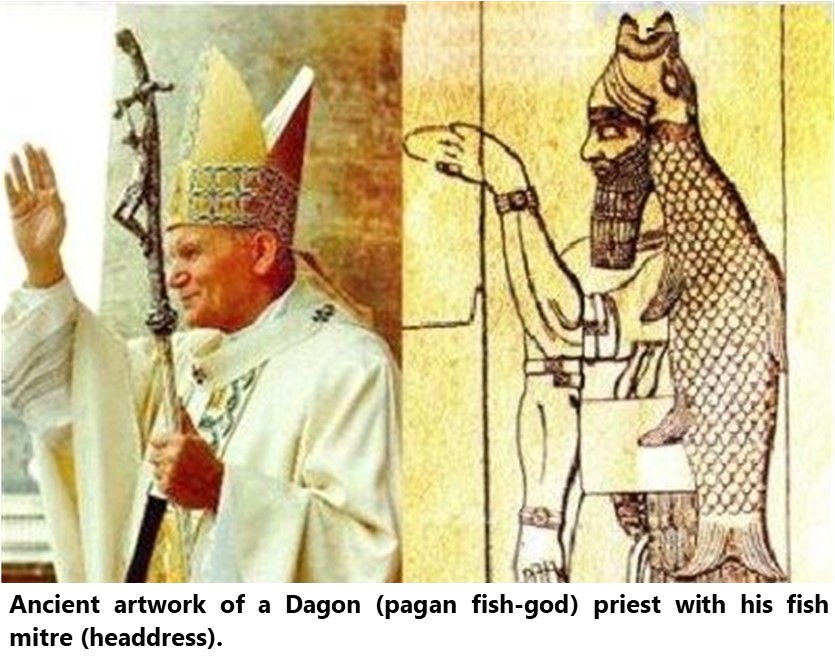
Although papal Rome continued to absorb pagan ideology, it is believed by some that the “taken away” of paganism’s political power was accomplished by the year 508AD. The pagan Franks restrained the rise of the papacy until the king of the Franks, Clovis, converted to Catholicism, being baptized in 508. Clovis' conversion, and uniting of the pagan Franks, led to the uprooting of the non-pagan Arians. "The event which intensified the fears of all the Arian kings", writes Thomas Hodgkin, "which left to each one little more than the hope that he might be the last to be devoured, was the conversion to Catholicism of Clovis, the heathen king of the Franks." (Theodoric the Goth, p. 186).
“With the correct understanding of the daily (hattamid) representing the self-exalting character of all pagan nations including Rome which was lifted up by papal Rome, it becomes clear that there is a contest or struggle not only between the horn (both phases) and the Prince of the host [Jesus], but also between the two phases of Rome. For example, not only was the daily lifted up by papal Rome from pagan Rome, but the place of his sanctuary was cast down by papal Rome in vs. 11. The struggle continues in a pitched battle in verse 12 where an army is given to the papal Rome against the ‘continual’ self-exalting behavior manifested by pagan forces toward God. This battle matured during the period of AD 496 to 508 when the first of the ten horns, the Franks led by Clovis following his conversion, became the ‘Eldest Son of the Church’ and used the sword to expand the power of the papacy. This culminated in AD 508 with subjection of the Arborici, the Roman garrisons in the West, Brittany, the Bergundians, and Visigoths. [Although wrongly represented] The Arian Visigoths represented the epitome of self-exalting behavior against God in the view of the Roman church. It is maintained that the host was an historical army, led by Clovis, resulting from a collaboration or union of church (papal Rome) and the state (Clovis & the Franks). This ‘host’ or unholy union represented a counterfeit army in contrast to the genuine host of heaven (verses 10 & 13), the saints of the Most High.” (John W. Peters, The Mystery of the Daily, 5.3.1, words in brackets added, words in parenthesis in original) 1
When translators insert the word sacrifices into the text, it throws the whole warning out of whack. False theories have been formulated, such as the belief that the antichrist power will be an end-time world-leader who will sign a decree for the Jews to rebuild their temple, only to take away the daily sacrifices in the midst of a seven-year peace treaty. This takes the focus off the real issues at stake. Why would an antichrist power ever take away animal sacrifices when God never desired nor required these sacrifices in order for Him to forgive us in the first place (Psalm 40:6)? God instituted animal sacrifices to reveal to us how depraved we are in our thinking, and to reveal our false understanding of justice which stems from the pagan system of penal atonement. An antichrist system would never take this away. Thus we are to understand that the term "daily" refers to Paganism and its appeasement system of sacrifices and that the term "trangression of desolation" refers to the papal appeasement system which has carried over into the Protestant mindset and theology. This type of worship has been a continual or daily sorrow for God. Satan perverted the most precious truths designed to be taught in the sacrifice and caused men to seek to appease God.
"What the text [in Daniel 8:11] is actually saying is that the papal power took up the principles of Paganism while at the same time removing the pagan framework and replacing it with a Christian one. The important point here is that the appeasement of the gods in the pagan system was lifted up and transformed into Roman Christianity and continued. Therefore, the two powers, pagan and papal Rome, continue the same principle of appeasement through sacrifices." (Adrian Ebens, At-One-Ment, pp. 129, 130. Note: we will be discussing this in more detail in a future study, but you can also see the article entitled: Why Did God Institute Animal Sacrifices?)
This is why God cried out: “My name (character) continually (tamid) every day is blasphemed.” It’s the misapprehension of God’s character that is the issue. Satan’s deceptions concerning God’s character is the foundation of the abomination of desolation which has continued ever since sin reared its ugly head. This misunderstanding of God and WHO He is was incorporated into the papal legal system and adopted by Protestantism.
“Indeed we shall find, that when Christianity became the established religion of the Roman Empire and took the place of paganism that it assumed in great degree the forms and titles of paganism and participated in no small measure of its spirit. Christianity as it existed in the Dark Ages, might be termed, without much impropriety of language, ‘Baptized Paganism.’” (Wharey's Church History, page 24)
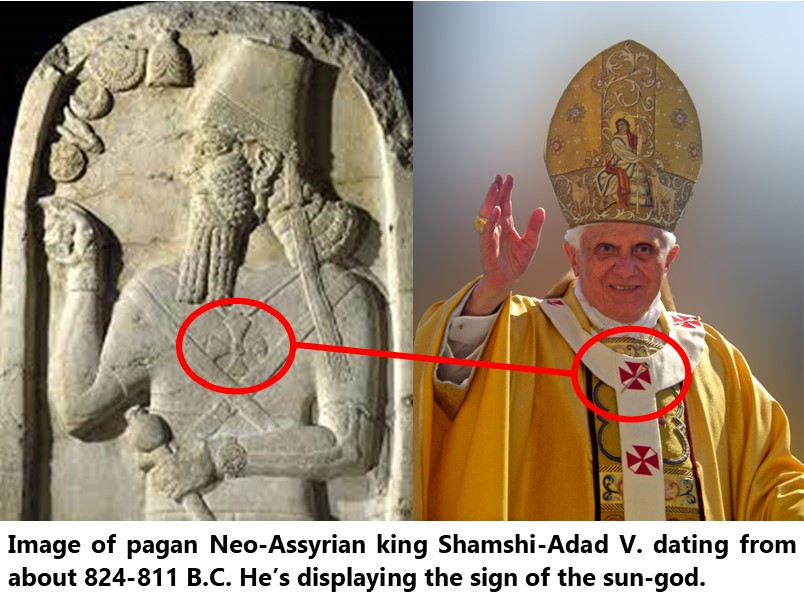
Keep in mind I am speaking about the system that the pope is in charge of and adopted by Protestantism. I am not referring to individual people. Daniel told King Nebuchadnezzar that he was the “head of gold” and was speaking of the system or power that Nebuchadnezzar represented—Babylon. We see the same thing here. The early Protestants referred to the pope when they were speaking of the system he represents—Papal Rome. And since this system is named “Babylon the great” then it’s the individual people, including the pope, whom God is speaking to when He pleads, “Babylon the great is fallen, is fallen … Come out of her, My people” (Revelation 18:2, 4).
Therefore, I’d like to emphasize that I am not pointing the finger at anyone else, but at OURSELVES as corporate humanity. In our fallen condition we all possess the same spirit of the little horn to “cause craft (deceit) to prosper in (our) hands (works)” and to “magnify (ourselves) in (our) hearts” (Daniel 8:25). The rise of the little horn power is but a reflection of our natural hatred towards God’s only begotten Son due to sin. Without Christ living and reigning within us, we display this beastly antagonistic spirit by our use of force, coercion, and retaliation upon others who simply sin differently than we do. Martin Luther once said, "I am more afraid of my own heart than of the pope and all his cardinals. I have within me the great pope, SELF.” Thus, I seek corporate repentance (for the whole human race) for our disbelief in our heavenly Father's forgiveness (which is free from anything to do with appeasement) and rest in His bosom as He gently teaches and redirects our path of selfishness to a path of unconditional love and service toward Him and our fellow humans whom Christ has purchased with infinite cost to Himself.
To be continued … The Little Horn (Part Two)
1 We will discuss more about Arianism in our next study.

.png)


.jpeg)
